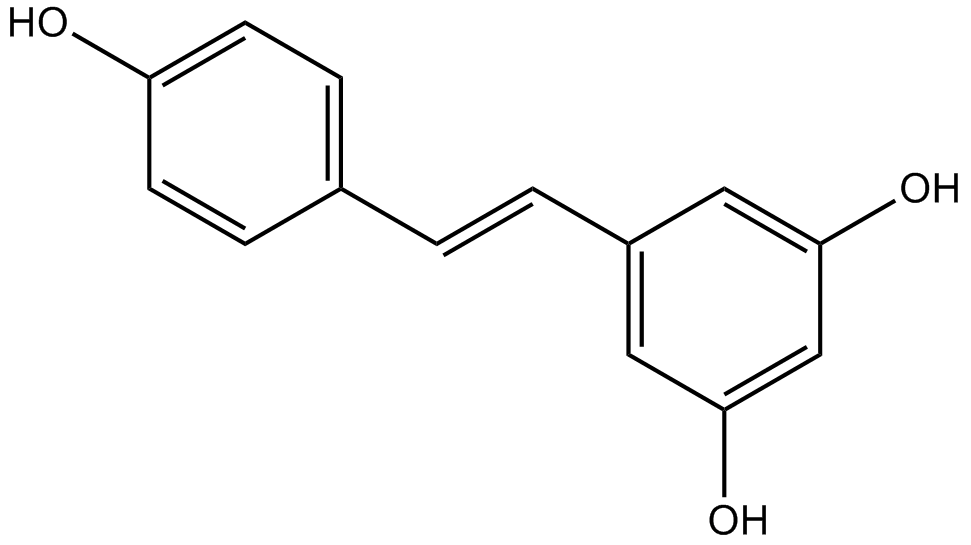Resveratrol (Synonyms: (E)Resveratrol) |
| Katalog-Nr.GC14553 |
Ein Polyphenol mit vielfältigen biologischen Aktivitäten.
Products are for research use only. Not for human use. We do not sell to patients.

Cas No.: 501-36-0
Sample solution is provided at 25 µL, 10mM.
Resveratrol (trans-Resveratrol; SRT501) is a phytoalexin. Resveratrol is a potent reducing agent, and can prevent carcinogenesis due to its anti-oxidant abilities [1]. Resveratrol has a broad range of targets, including cyclooxygenase (e.g., COX, IC50=1.1 μM), lipoxygenase (LOC, IC50=2.7 μM), STAT3 (IC50=20 μM), and other proteins [2,3].
Resveratrol treatment is found to exert its effect on renal cell carcinoma (RCC) proliferation, migration and invasion in a concentration dependent manner through inactivation of the Akt and ERK1/2 signaling pathways [4]. In CaCo-2 cells, treatment with 25 μM Resveratrol has shown 70% growth inhibition due to S/G2 phase arrest [5]. Resveratrol treatment lead to inhibited invasion and metastasis of colorectal cancer-derived cell lines LoVo and HCT116 by suppressing the Wnt/β-catenin signaling mediated target genes of c-Myc, MMP-7, and MALT-1[6].
Resveratrol is shown to be effective against breast cancer metastasis to lungs in mice by its inhibitory effect on Stat3 mediated signaling [7]. Resveratrol treatment reduced size and number of tumor spheres in renal carcinoma stem cells xenograft mice model [8]. Resveratrol treatment reduced Epithelial to mesenchymal transition (EMT) of glioblastoma U87 xenografted mice models [9].
References:
[1]. Bhaskara V K, Mittal B, Mysorekar V V, et al. Resveratrol, cancer and cancer stem cells: A review on past to future[J]. Current Research in Food Science, 2020, 3: 284-295.
[2]. Calamini B, Ratia K, Malkowski M G, et al. Pleiotropic mechanisms facilitated by resveratrol and its metabolites[J]. Biochemical Journal, 2010, 429(2): 273-282.
[3]. Pirola L, Fr?jd? S. Resveratrol: one molecule, many targets[J]. IUBMB life, 2008, 60(5): 323-332.
[4]. Zhao Y, Tang H, Zeng X, et al. Resveratrol inhibits proliferation, migration and invasion via Akt and ERK1/2 signaling pathways in renal cell carcinoma cells[J]. Biomedicine & Pharmacotherapy, 2018, 98: 36-44.
[5]. Schneider Y, Vincent F, Duranton B, et al. Anti-proliferative effect of resveratrol, a natural component of grapes and wine, on human colonic cancer cells[J]. Cancer letters, 2000, 158(1): 85-91.
[6]. Ji Q, Liu X, Fu X, et al. Resveratrol inhibits invasion and metastasis of colorectal cancer cells via MALAT1 mediated Wnt/β-catenin signal pathway[J]. PloS one, 2013, 8(11): e78700.
[7]. Lee-Chang C, Bodogai M, Martin-Montalvo A, et al. Inhibition of breast cancer metastasis by resveratrol-mediated inactivation of tumor-evoked regulatory B cells[J]. The Journal of Immunology, 2013, 191(8): 4141-4151.
[8]. Ji Q, Liu X, Fu X, et al. Resveratrol inhibits invasion and metastasis of colorectal cancer cells via MALAT1 mediated Wnt/β-catenin signal pathway[J]. PloS one, 2013, 8(11): e78700.
[9]. Song Y, Chen Y, Li Y, et al. Resveratrol suppresses epithelial-mesenchymal transition in GBM by regulating Smad-dependent signaling[J]. BioMed Research International, 2019, 2019.
Average Rating: 5 (Based on Reviews and 30 reference(s) in Google Scholar.)
GLPBIO products are for RESEARCH USE ONLY. Please make sure your review or question is research based.
Required fields are marked with *




